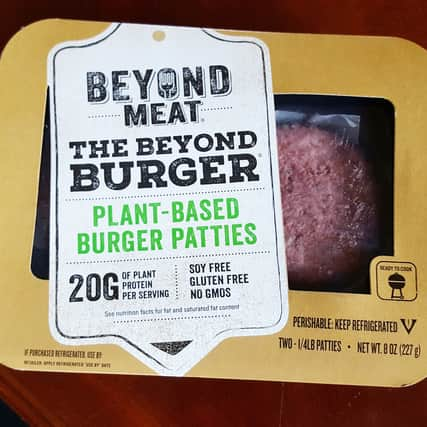Most people will eat vegan ‘meat alternatives’ by 2040


The majority of ‘meat’ consumed by 2040 will not actually come from animals, according to a new report.
According to a new report compiled from expert interviews, the meat that people eat in 2040 will not actually come from animals.
Advertisement
Hide AdAdvertisement
Hide AdThe research - compiled from expert interviews - states that 60 per cent of ‘meat’ will be a vegan plant based alternative, or grown in a way that doesn’t require killing animals.
What does the report say?
The report was produced by global consultancy AT Kearney and looked at factors such as the environmental impact of meat production and the concerns that people have regarding animal welfare.
The report stated that the large-scale livestock industry is “viewed by many as an unnecessary evil”.
“With the advantages of novel vegan meat replacements and cultured meat over conventionally produced meat, it is only a matter of time before they capture a substantial market share,” the report predicted.
Advertisement
Hide AdAdvertisement
Hide AdBreaking down the numbers surrounding livestock and their impact on harvest production, the report said, “Nearly half of the worldwide harvest is required to feed the livestock population.”
“We could feed around twice as many humans with today’s global harvest if we did not feed livestock but rather consumed the yield ourselves.”
Plant-based diets would also provide the same calories and nutritional value, according to the study.
Estimating that 35 per cent of all meat will be cultured and 25 per cent will be vegan replacements by 2040, the report also highlights how these alternatives hold greater efficiency than conventional meat production.
Advertisement
Hide AdAdvertisement
Hide AdMeat alternatives
The report examined the way that non-traditional meat alternatives could be employed and the effects they would have.
The main alternatives the report was concerned with was:
Cultured meatNovel vegan meat replacements
Cultured meat, “also referred to as clean meat, cell-based meat, or slaughter-free meat”, is meat that has been grown in a lab that works off a profile made from the cells of a living animal.
The report said, “The result is meat which is identical to conventionally produced meat.”
Regarding new vegan meat replacements, the report looked at brands such as Impossible Foods, Just, and Beyond Meat and how they’ve grown since 2018.
Advertisement
Hide AdAdvertisement
Hide Ad“[They] have received substantial financing (totaling over £700 million up to 2018). Their products are already available in restaurants and supermarkets in several countries,” the report said.
Disrupting the meat industry
The AT Kearney report predicts that “cultured meat and new meat replacement products are going to disrupt the $1,000 billion conventional meat industry with all its supplier companies.”
They feel that this prediction is supported by the fact that already in today's society we can see a pattern of vegan and vegetarian diets increasing in popularity.
“This disruption is supported by a general shift toward consumption of non-meat proteins,” the report explains.
Advertisement
Hide AdAdvertisement
Hide AdFarmers’ response
A National Farmers’ Union spokesman said, “Innovation and new technology has always been central to the progress of British livestock farming.
“Although the science of lab-grown meat is interesting, the NFU believes there is great potential for livestock farming to continue its journey of producing safe, traceable and affordable food for the nation and it will continue to do so as long as the public demands it.”
This article originally appeared on our sister site Sunderland Echo